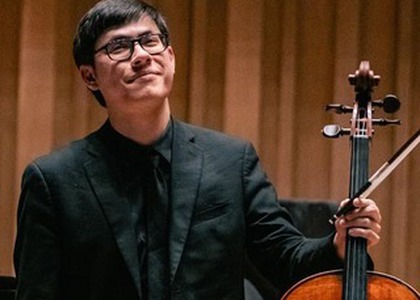> Interviews

Interview with cellist Zlatomir Fung
Winner of the 2016 Enescu Contest, the cellist will perform as the soloist of the George Enescu Philharmonic Orchestra concerts on December 12th and 13th, 2024. He will perform Dmitri Shostakovich's Cello Concerto No. 1, with Leo Hussain on the conductor'spodium.
Zlatomir Fung, you return to Bucharest a few years after your triumph in the final of the 2016 Enescu Contest, when, at the age of only 17, you won the First Prize, thus becoming the youngest-ever winner in the cello section. You will also perform as the soloist of the George Enescu Philharmonic Orchestra, the same ensemble you collaborated with during the final of the contest. How would you describe this experience and what memories do you have of interacting with the orchestra?
The Enescu Contest was one of the most important events in my lifeas a musician, since I believe it was the first major international competition I took part in, and I was very fortunate to win it. I have very fond memories of that experience from eight years ago. It was my first time travelling to Romania and I was delighted to meet great musicians. During the contest, I had the chance to meet wonderful Iulian Ochescu, the pianist with whom I collaborated during the first round and with whom I later worked for several years. I cannot forget the magnificentconcert hall or the acoustics of the Romanian Athenaeum, as well as the culture here, which had a great impact on me. So, it is a great honor to have the opportunity to return to Bucharest and perform with the George Enescu Philharmonic Orchestra this week. As for my collaboration with the orchestra, in the final of the Enescu Contest, I performed George Enescu's Symphonie Concertante. That was quite an unusual experience for me, as it was the first time I had performed it, but since it is such a unique Romanian piece, the special connection the orchestra members had to this music and the way in which they resonated with itstuck with me. I also remember that I returned to Romania the following year, when I had the opportunity to perform a shorter piece, Parabola concertante by Rodion Shchedrin, at the Enescu Festival. That was another beautiful experience, and I am looking forward to performing again with the George Enescu Philharmonic Orchestra. My memories of the rehearsals with them are a bit more distant, but I know I really enjoyed working with them.
After the Enescu Contest, you won the 2019 Tchaikovsky Contest in Moscow and have given numerous performances with major orchestras ever since. How do you manage to create that crucial musical connectionbetween the soloist, the ensemble, and the conductor?
This process differs a bit every time. As far as the soloist is concerned, things depend quite a lot on the conductor - that is why I am really looking forward to working with Maestro Leo Hussain this week. It also differs depending on the piece I am performing. In the case of the Shostakovich concerto, for instance, the musical discussions will be very different from those we would have for a work like the Elgar concerto. Another important aspect is the acoustics of the hall, which can be fantastic, like thoseof the Romanian Athenaeum, or less favorable, which may prove to be an additional challenge. There are many variables that can arise, things you need to adjust to, but I find such factors particularly stimulating, as they make every performance unique, turning it into a new challenge.
Where does Shostakovich's Cello Concerto No. 1 stand in your repertoire and how would you describe it in relation to other 20th-century concertos?
Shostakovich's Cello Concerto No. 1 is, I believe, my favourite work belonging to the 20th-century cello concerto repertoire. Personally, I think it is extremely well-written, both in terms of structure, the extraordinary way in which Shostakovich develops musical ideas, and the writing of the solo part. To me, it feels like a journey with a very clear logic throughout the entire concerto. Not to mention the mastery of the orchestration - there are many moments of breathtaking beauty, one of my favorite moments being the first part, where the solo cello and horn play together, and where Shostakovich manages to capture the sound of the entire orchestra with just these two instruments. Moreover, I consider the third part - the famous solo cadenza, which lasts about five minutes - to be absolutely extraordinary, the most impressive solo cello score after Bach's Suites. It is one of the finest pieces ever written for the instrument, and for me, it is a true honour every time I have the chance to perform it.
Translated by Mara Scoroșanu,
University of Bucharest, Faculty of Foreign Languages and Literatures, MTTLC, year I
Corrected by Silvia Petrescu














